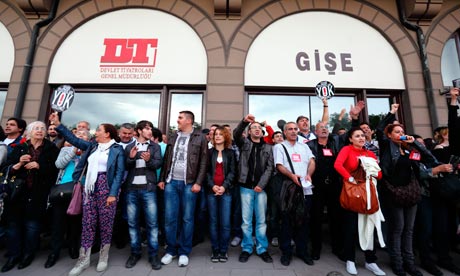
Turkish actors protest outside the Devlet Tiyatrosu, Turkey's national theatre, in Ankara. Photograph: Roberto Giobbi/Demotix/Corbis
In a tale which could have come straight from the time of the sultans, when one wrong word could seal your fate, the Turkish prime minister,Recep Tayyip Erdogan, is threatening to withdraw state support from the country's theatres after his daughter said she was insulted by an actor during a play.
Erdogan, who dabbled in amateur dramatics as a student, has a reputation for wearing his heart on his sleeve. But his tirades against "arrogant, alcoholic actors" and an arts establishment he claims holds ordinary people in contempt have shocked Turkey.
Theatres cannot take government subsidies and then criticise the hand that feeds them, he said. "They have started to humiliate and look down on us and all conservatives."
Actors took to the streets in protest after civil servants were handed artistic control of Istanbul theatres overnight last month in a separate row over an "obscene" play.
"If support is needed, then we the government can support the plays we want," Erdogan said. "I am privatising the theatre. No theatres are being run by the state in almost any developed country. Here there is freedom. When we privatise the theatres you can play whatever you want. Sorry, but you cannot get your salary from the municipality and then criticise the management. There is no such absurdity."
He railed against the "despotic arrogance" of intellectuals who always think they know best: "For God's sake, who are you? From where do you get the authority to express opinions on every issue, to argue that you know everything? Are theatres your monopoly in this country? Are arts your monopoly? These days are gone."
What some are calling "Turkey's culture war" began in April last year when his youngest daughter, Sümeyye Erdogan, 30, walked out of a performance of Young Osman at the Ankara state theatre. Its story of a young, reforming sultan overthrown by a boorish military has a rich echo for the Erdogans and the AK party, who have broken the army's hold on Turkey. What exactly happened during an improvised sequence when the uncouth soldiers growl at the audience is still disputed, but she claims she was humiliated by an actor, Tolga Tuncer, who picked on her because she was wearing a headscarf, mimicking her chewing gum and making offensive "haka-style" gestures at her.
Sümeyye Erdogan went to university overseas – studying in the US and at the London School of Economics – because headscarves were banned at the time in Turkish academic institutions. In an impassioned letter to Tuncer on Facebook, she appealed for the kind of tolerance she was accorded in Britain and the US. "As an artist you should be first to treat people who are different with respect … you had better get used to people with headscarves. Half of the people of Turkey are women and many of them wear headscarves. I don't want to live my life fighting you. I will continue to love art and theatre and continue attending the theatre with my headscarf."
Suspended and summoned before the culture minister, who said actors had "no right to interact with their audiences", Tuncer refused to apologise for his actions, which he said were part of the play, but said he was sorry she had been offended. He claimed he did not know who she was and picked on her only because she was in the front row and was chewing gum.
Then last month's controversy over an allegedly obscene play was used by Istanbul's mayor, an Erdogan protege, to take artistic control of its municipal theatres after a religiously conservative playwright condemned Chilean playwright Marco Antonio de la Parra's Daily Obscene Secrets without seeing it as "vulgarity at the hands of the state". The play, an attack on the values of Chile's military dictatorship, which had much in common with the Turkish generals who once locked Erdogan up, had been performed more than 70 times without protest, but is now being removed from the repertoire.
Arts organisations described the attacks as a "pointless witchhunt", pointing out that the theatre is subsidised in almost every developed country and that Turkey's state theatres are the fullest in Europe, thanks to low prices and a mostly traditional repertoire that appeals to conservative and religious audiences in the governing AK party's Anatolian heartlands.
The crisis deepened this week as Istanbul's theatre festival opened. Its director, Dr Dikmen Gürün, appealed for calm and said that cuts would be a disaster for smalltown Anatolia, where most stages are subsidised. Others say it will hit the Turkish TV industry, which relies on theatres to train actors for its series, which have huge followings throughout the Balkans and the Middle East.
Nor has the spat done anything to improve Turkey's tattered reputation for free speech, with 100 mostly Kurdish journalists still in jail awaiting trial under anti-terror laws that date from the days of military rule. Despite Erdogan's reputation as reformer, human rights groups are worried by an atmosphere of self-censorship, while the opposition accuses his AK party of using authoritarian legal machinery left over from military rule to undermine the country's long secular tradition that it was meant to protect.